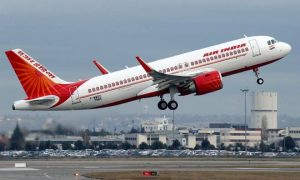Akasa Air’s rapid rise mirrors booming growth, while Boeing invests $100M to fortify domestic pilot training.
In a groundbreaking revelation, Salil Gupte, the President of Boeing India, stated that India is swiftly soaring to become one of the world’s largest aviation markets, with an unstoppable growth trajectory.
The newest competitor, the ground-breaking Akasa Air, backed by the brilliant Rakesh Jhunjhunwala, serves as evidence of India’s aviation potential.
Read More: SpiceJet’s Independence Day sale: Airfares starting at Rs 1,515. Check details
Boeing India’s President, Salil Gupte further highlighted the astounding progress made by Akasa Air, he remarked, “Akasa is a shining example. Their initial purchase of 72 aircraft was just the beginning; they have now expanded their fleet with an order for four more planes. Akasa Air has achieved unprecedented growth, setting a new benchmark in aviation startup history.”
Besides this, the national carrier has sealed deals for a whopping 190 Boeing 737 MAXes, along with 20 state-of-the-art 787 Dreamliners and 10 cutting-edge 777Xes. Meanwhile, the meteoric rise of Akasa Air, marking its first anniversary of operations, cannot be overlooked as it recently placed a monumental order for 72 aircraft.
Read More: Kochi Metro announces exclusive ticket discounts for August 15 commuters; Read
These developments highlight India’s long-term, steady progress in the aviation sector. These figures are undoubtedly large, but they represent just a small portion of the region’s anticipated total of almost 2,400 aircraft over the next two decades.
Speaking passionately about India’s aviation future, Gupte revealed, “The upcoming fleet of 2,400 airplanes will necessitate a staggering 37,000 pilots, and a comparable number of skilled mechanics will be required to maintain these aircraft. Our commitment is to foster a robust pilot training ecosystem within India, ensuring that our pilots can be trained right within our borders, without needing to venture abroad.”
Amidst the ongoing challenges, including the grounding of Go First due to a crisis, Gupte maintained a steady perspective. He commented, “While the situation with Go First remains uncertain, it’s important to note that this is a momentary blip. The long-term trajectory of Indian aviation is undeniably one of growth. Although the path might not always be straight, the overall trend remains steadfast.”
With the announcement of a sizable $100 million investment aimed at boosting infrastructure and pilot training programmes in the nation, Boeing reaffirmed its unwavering commitment to India’s aviation industry.





































